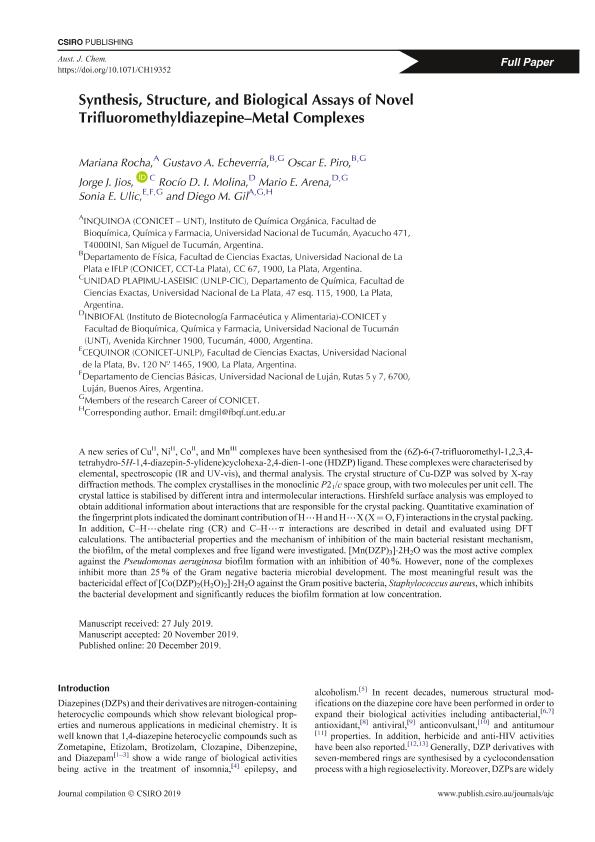Artículo
Synthesis, Structure, and Biological Assays of Novel Trifluoromethyldiazepine–Metal Complexes
Rocha, Mariana ; Echeverría, Gustavo Alberto
; Echeverría, Gustavo Alberto ; Piro, Oscar Enrique
; Piro, Oscar Enrique ; Jios, Jorge Luis; Molina, Rocío Daniela Inés
; Jios, Jorge Luis; Molina, Rocío Daniela Inés ; Arena, Mario Eduardo
; Arena, Mario Eduardo ; Ulic, Sonia Elizabeth
; Ulic, Sonia Elizabeth ; Gil, Diego Mauricio
; Gil, Diego Mauricio
 ; Echeverría, Gustavo Alberto
; Echeverría, Gustavo Alberto ; Piro, Oscar Enrique
; Piro, Oscar Enrique ; Jios, Jorge Luis; Molina, Rocío Daniela Inés
; Jios, Jorge Luis; Molina, Rocío Daniela Inés ; Arena, Mario Eduardo
; Arena, Mario Eduardo ; Ulic, Sonia Elizabeth
; Ulic, Sonia Elizabeth ; Gil, Diego Mauricio
; Gil, Diego Mauricio
Fecha de publicación:
12/2019
Editorial:
Csiro Publishing
Revista:
Australian Journal of Chemistry
ISSN:
0004-9425
Idioma:
Inglés
Tipo de recurso:
Artículo publicado
Clasificación temática:
Resumen
A new series of CuII, NiII, CoII, and MnIII complexes have been synthesised from the (6Z)-6-(7-trifluoromethyl-1,2,3,4-tetrahydro-5H-1,4-diazepin-5-ylidene)cyclohexa-2,4-dien-1-one (HDZP) ligand. These complexes were characterised by elemental, spectroscopic (IR and UV-vis), and thermal analysis. The crystal structure of Cu-DZP was solved by X-ray diffraction methods. The complex crystallises in the monoclinic P21/c space group, with two molecules per unit cell. The crystal lattice is stabilised by different intra and intermolecular interactions. Hirshfeld surface analysis was employed to obtain additional information about interactions that are responsible for the crystal packing. Quantitative examination of the fingerprint plots indicated the dominant contribution of H⋯H and H⋯X (X = O, F) interactions in the crystal packing. In addition, C-H⋯chelate ring (CR) and C-H⋯π interactions are described in detail and evaluated using DFT calculations. The antibacterial properties and the mechanism of inhibition of the main bacterial resistant mechanism, the biofilm, of the metal complexes and free ligand were investigated. [Mn(DZP)3]·2H2O was the most active complex against the Pseudomonas aeruginosa biofilm formation with an inhibition of 40 %. However, none of the complexes inhibit more than 25 % of the Gram negative bacteria microbial development. The most meaningful result was the bactericidal effect of [Co(DZP)2(H2O)2]·2H2O against the Gram positive bacteria, Staphylococcus aureus, which inhibits the bacterial development and significantly reduces the biofilm formation at low concentration.
Palabras clave:
DIAZEPINE
,
METAL COMPLEXES
,
INTERMOLECULAR INTERACTIONS
,
DFT CALCULATIONS
Archivos asociados
Licencia
Identificadores
Colecciones
Articulos(INQUINOA)
Articulos de INST.DE QUIMICA DEL NOROESTE
Articulos de INST.DE QUIMICA DEL NOROESTE
Citación
Rocha, Mariana; Echeverría, Gustavo Alberto; Piro, Oscar Enrique; Jios, Jorge Luis; Molina, Rocío Daniela Inés; et al.; Synthesis, Structure, and Biological Assays of Novel Trifluoromethyldiazepine–Metal Complexes; Csiro Publishing; Australian Journal of Chemistry; 73; 1; 12-2019; 1-12
Compartir
Altmétricas



